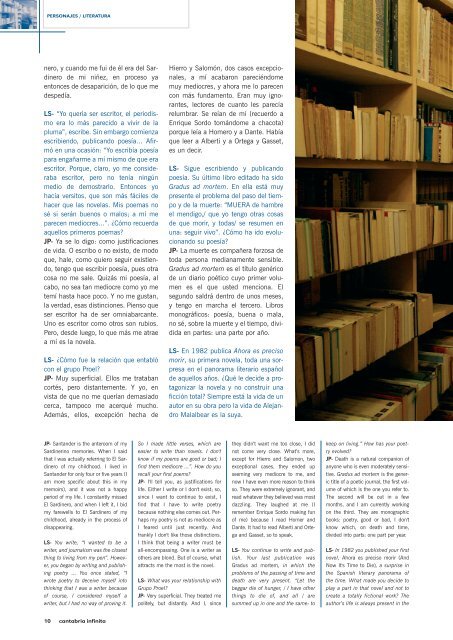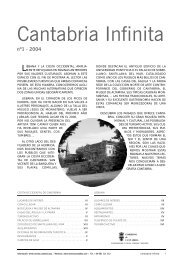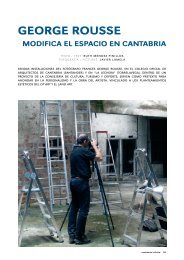Jesús Pardo Jesús Pardo - Cultura de Cantabria
Jesús Pardo Jesús Pardo - Cultura de Cantabria
Jesús Pardo Jesús Pardo - Cultura de Cantabria
Create successful ePaper yourself
Turn your PDF publications into a flip-book with our unique Google optimized e-Paper software.
PERSONAJES / LITERATURA<br />
nero, y cuando me fui <strong>de</strong> él era <strong>de</strong>l Sardinero<br />
<strong>de</strong> mi niñez, en proceso ya<br />
entonces <strong>de</strong> <strong>de</strong>saparición, <strong>de</strong> lo que me<br />
<strong>de</strong>spedía.<br />
LS- “Yo quería ser escritor, el periodismo<br />
era lo más parecido a vivir <strong>de</strong> la<br />
pluma”, escribe. Sin embargo comienza<br />
escribiendo, publicando poesía... Afirmó<br />
en una ocasión: “Yo escribía poesía<br />
para engañarme a mí mismo <strong>de</strong> que era<br />
escritor. Porque, claro, yo me consi<strong>de</strong>raba<br />
escritor, pero no tenía ningún<br />
medio <strong>de</strong> <strong>de</strong>mostrarlo. Entonces yo<br />
hacía versitos, que son más fáciles <strong>de</strong><br />
hacer que las novelas. Mis poemas no<br />
sé si serán buenos o malos; a mí me<br />
parecen mediocres...”. ¿Cómo recuerda<br />
aquellos primeros poemas?<br />
JP- Ya se lo digo: como justificaciones<br />
<strong>de</strong> vida. O escribo o no existo, <strong>de</strong> modo<br />
que, hale, como quiero seguir existiendo,<br />
tengo que escribir poesía, pues otra<br />
cosa no me sale. Quizás mi poesía, al<br />
cabo, no sea tan mediocre como yo me<br />
temí hasta hace poco. Y no me gustan,<br />
la verdad, esas distinciones. Pienso que<br />
ser escritor ha <strong>de</strong> ser omniabarcante.<br />
Uno es escritor como otros son rubios.<br />
Pero, <strong>de</strong>s<strong>de</strong> luego, lo que más me atrae<br />
a mí es la novela.<br />
LS- ¿Cómo fue la relación que entabló<br />
con el grupo Proel?<br />
JP- Muy superficial. Ellos me trataban<br />
cortés, pero distantemente. Y yo, en<br />
vista <strong>de</strong> que no me querían <strong>de</strong>masiado<br />
cerca, tampoco me acerqué mucho.<br />
A<strong>de</strong>más, ellos, excepción hecha <strong>de</strong><br />
JP- Santan<strong>de</strong>r is the anteroom of my<br />
Sardinerino memories. When I said<br />
that I was actually referring to El Sardinero<br />
of my childhood. I lived in<br />
Santan<strong>de</strong>r for only four or five years (I<br />
am more specific about this in my<br />
memoirs), and it was not a happy<br />
period of my life. I constantly missed<br />
El Sardinero, and when I left it, I bid<br />
my farewells to El Sardinero of my<br />
childhood, already in the process of<br />
disappearing.<br />
LS- You write, “I wanted to be a<br />
writer, and journalism was the closest<br />
thing to living from my pen”. However,<br />
you began by writing and publishing<br />
poetry ... You once stated, “I<br />
wrote poetry to <strong>de</strong>ceive myself into<br />
thinking that I was a writer because<br />
of course, I consi<strong>de</strong>red myself a<br />
writer, but I had no way of proving it.<br />
10 cantabria infinita<br />
Hierro y Salomón, dos casos excepcionales,<br />
a mí acabaron pareciéndome<br />
muy mediocres, y ahora me lo parecen<br />
con más fundamento. Eran muy ignorantes,<br />
lectores <strong>de</strong> cuanto les parecía<br />
relumbrar. Se reían <strong>de</strong> mí (recuerdo a<br />
Enrique Sordo tomándome a chacota)<br />
porque leía a Homero y a Dante. Había<br />
que leer a Alberti y a Ortega y Gasset,<br />
es un <strong>de</strong>cir.<br />
LS- Sigue escribiendo y publicando<br />
poesía. Su último libro editado ha sido<br />
Gradus ad mortem. En ella está muy<br />
presente el problema <strong>de</strong>l paso <strong>de</strong>l tiempo<br />
y <strong>de</strong> la muerte: “MUERA <strong>de</strong> hambre<br />
el mendigo,/ que yo tengo otras cosas<br />
<strong>de</strong> que morir, y todas/ se resumen en<br />
una: seguir vivo”. ¿Cómo ha ido evolucionando<br />
su poesía?<br />
JP- La muerte es compañera forzosa <strong>de</strong><br />
toda persona medianamente sensible.<br />
Gradus ad mortem es el título genérico<br />
<strong>de</strong> un diario poético cuyo primer volumen<br />
es el que usted menciona. El<br />
segundo saldrá <strong>de</strong>ntro <strong>de</strong> unos meses,<br />
y tengo en marcha el tercero. Libros<br />
monográficos: poesía, buena o mala,<br />
no sé, sobre la muerte y el tiempo, dividida<br />
en partes: una parte por año.<br />
LS- En 1982 publica Ahora es preciso<br />
morir, su primera novela, toda una sorpresa<br />
en el panorama literario español<br />
<strong>de</strong> aquellos años. ¿Qué le <strong>de</strong>ci<strong>de</strong> a protagonizar<br />
la novela y no construir una<br />
ficción total? Siempre está la vida <strong>de</strong> un<br />
autor en su obra pero la vida <strong>de</strong> Alejandro<br />
Malalbear es la suya.<br />
So I ma<strong>de</strong> little verses, which are<br />
easier to write than novels. I don't<br />
know if my poems are good or bad; I<br />
find them mediocre ...”. How do you<br />
recall your first poems?<br />
JP- I'll tell you, as justifications for<br />
life. Either I write or I don't exist; so,<br />
since I want to continue to exist, I<br />
find that I have to write poetry<br />
because nothing else comes out. Perhaps<br />
my poetry is not as mediocre as<br />
I feared until just recently. And<br />
frankly I don't like those distinctions.<br />
I think that being a writer must be<br />
all-encompassing. One is a writer as<br />
others are blond. But of course, what<br />
attracts me the most is the novel.<br />
LS- What was your relationship with<br />
Grupo Proel?<br />
JP- Very superficial. They treated me<br />
politely, but distantly. And I, since<br />
they didn’t want me too close, I did<br />
not come very close. What’s more,<br />
except for Hierro and Salomon, two<br />
exceptional cases, they en<strong>de</strong>d up<br />
seeming very mediocre to me, and<br />
now I have even more reason to think<br />
so. They were extremely ignorant, and<br />
read whatever they believed was most<br />
dazzling. They laughed at me (I<br />
remember Enrique Sordo making fun<br />
of me) because I read Homer and<br />
Dante. It had to read Alberti and Ortega<br />
and Gasset, so to speak.<br />
LS- You continue to write and publish.<br />
Your last publication was<br />
Gradus ad mortem, in which the<br />
problems of the passing of time and<br />
<strong>de</strong>ath are very present. “Let the<br />
beggar die of hunger, / I have other<br />
things to die of, and all / are<br />
summed up in one and the same: to<br />
keep on living.” How has your poetry<br />
evolved?<br />
JP- Death is a natural companion of<br />
anyone who is even mo<strong>de</strong>rately sensitive.<br />
Gradus ad mortem is the generic<br />
title of a poetic journal, the first volume<br />
of which is the one you refer to.<br />
The second will be out in a few<br />
months, and I am currently working<br />
on the third. They are monographic<br />
books: poetry, good or bad, I don't<br />
know which, on <strong>de</strong>ath and time,<br />
divi<strong>de</strong>d into parts: one part per year.<br />
LS- In 1982 you published your first<br />
novel, Ahora es preciso morir (And<br />
Now It's Time to Die), a surprise in<br />
the Spanish literary panorama of<br />
the time. What ma<strong>de</strong> you <strong>de</strong>ci<strong>de</strong> to<br />
play a part in that novel and not to<br />
create a totally fictional work? The<br />
author’s life is always present in the




